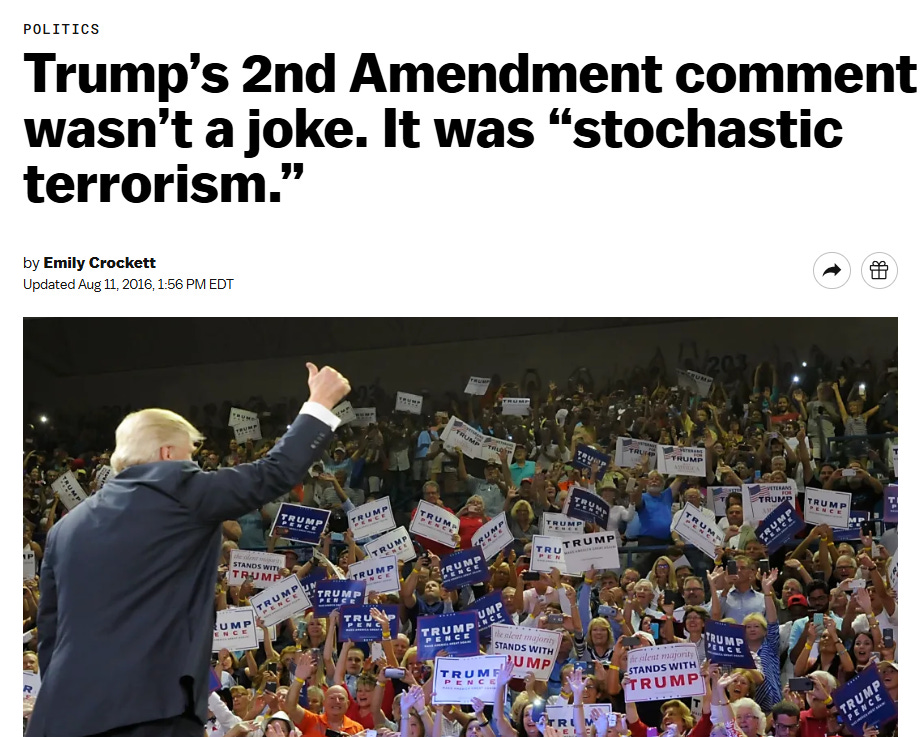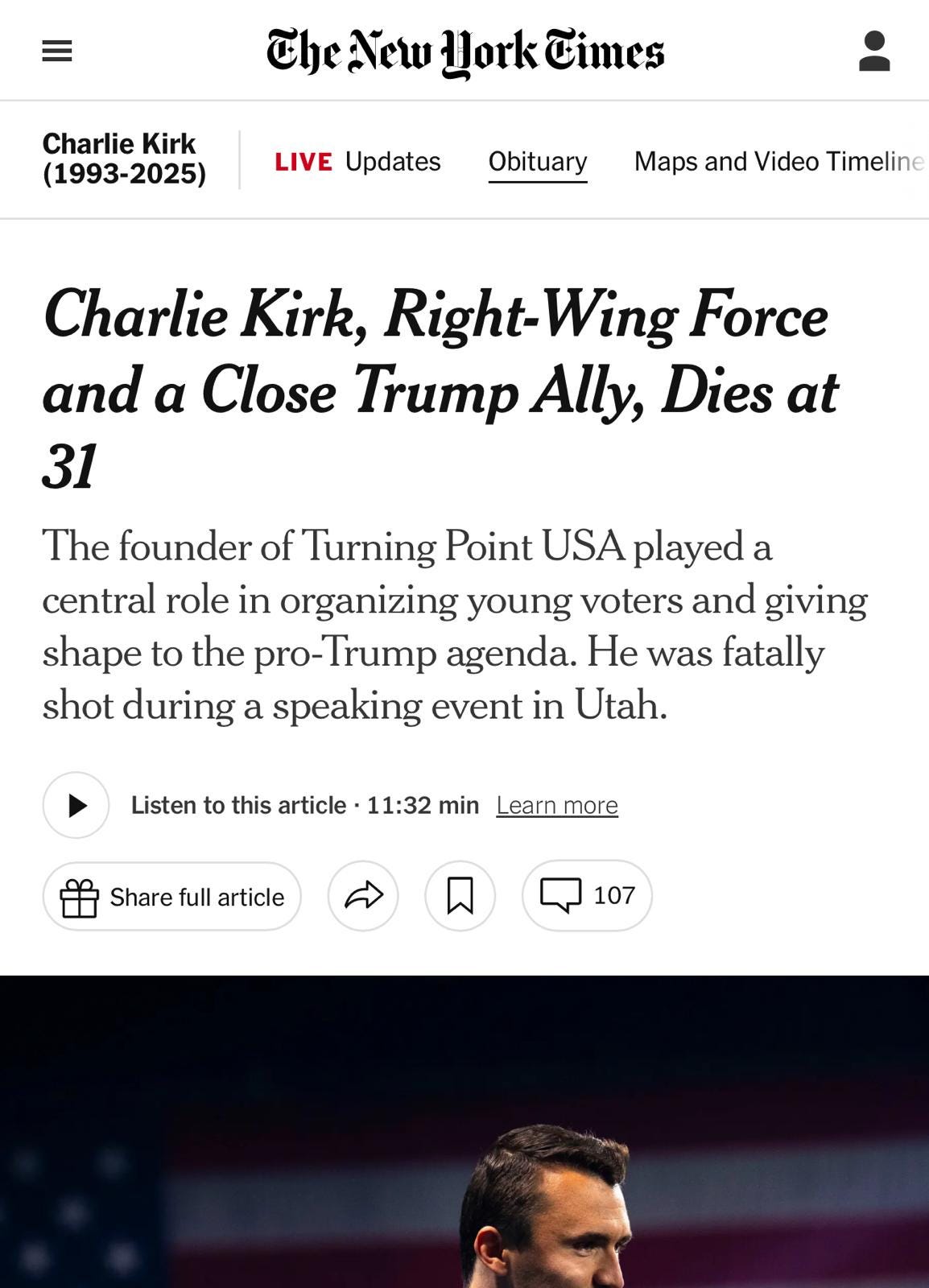Stochastic Terrorism
The Murder of Charlie Kirk
"The evildoers responsible for my husband's assassination have no idea what they have done." - Erika Kirk
“You can kill a man but you can’t kill an idea.” - Sophocles
Where Has Stochastic Terrorism Gone?
‘Stochastic terrorism’ was a popular concept in 2016 and 2017. It has faded from the discourse, as it has become increasingly clear that the outstanding reservoir of political extremism, violence, and hatred increasingly lies on the left.
Stochastic terrorism refers to the implied or overt ignition or encouragement of violence, especially political violence. It has some flaws - one being that it’s too vague and broadly applied. Is a leader or a candidate who rails against opponents and calls them liars or evil (or fascists) or vermin a stochastic terrorist? Does violence actually have to result for the concept to apply? One would think that it would, otherwise we’re simply ascribing motives to speakers based on our own biases and prejudices. But, as with so many other political lenses in the West, the greatest weakness of stochastic terrorism is that it’s unevenly applied. An intentionally misunderstood or misquoted (out of context) quote by Donald Trump will be labelled stochastic terrorism… while the explicit support of BLM-linked violence or hostile and inflammatory campus protests won’t be.
We can see that double standard in many different places in the aftermath of the murder of Charlie Kirk. Van Jones, Barack Obama, and many, many more contributors to the discussion have cautioned us that we simply don’t know what the shooter’s motivation was. Did these people use that same caution in the aftermath of the death of George Floyd? Did anyone on the left point out that his death probably wasn’t intentional, and that there was no evidence that Derek Chauvin was motivated by racism?
That is the game. When leftists commit political violence, it’s wise to be cautious and avoid speculating and come together and (of course) avoid ‘politicizing’ the event. When right-wingers commit political violence the cautious and conciliatory instincts disappear altogether. Of course, people on both sides do this. It’s human nature to apply a friendlier heuristic and a looser ethical standard to those one is affiliated with. But this tendency seems to be particularly strong on the left, partly because the left’s ideas are vastly overrepresented in elite cultural spaces.
We can see these asymmetries everywhere. As I’ve written elsewhere, only one side demands censorship. Or take the concept of ‘hate speech.’ Comments that are critical of gender ideology or open borders are criticized because they whip up fear and hostility, and could lead to violence. In many cases a kind of rhetorical sleight of hand is used, in which comments (for example) against mass migration are described (even regularly in the mainstream liberal media) as 'anti-immigrant.’ Even more frequently, sober and popular views about sex boundaries for athletic events or the medical ethics of gender procedures for minors are labelled as ‘anti-trans.’ But many (most) American immigrants support these supposedly ‘anti-immigrant’ policies, and many trans people support these ‘anti-trans’ ones. But let’s say that there is some small degree of anti-trans violence. I’ve never seen any evidence that it’s a problem even worth discussing in terms of the numbers, but if there is such an issue and comments against gender ideology are feeding into it, then it’s conceivable that perhaps the ideas are contributing to violence, however indirectly and feebly. But then there is a serious problem with violence against police as well, some of it explicitly political. Surely anti-police rhetoric, even simply arguments that racism is an issue for the police departments, is contributing to that problem in a similar way?
‘At least 66 law enforcement officers in the U.S. have been shot this year in ambush attacks, according to the Fraternal Order of Police, sparking concern for officers across the country.’
If ‘hate speech’ is making the lives of trans people and migrants less safe (which isn’t an argument that I’ve ever heard developed or supported with data or examples - it’s simply stated as a self-evident fact) then ‘hate speech’ against police is making them less safe, and so any discussion of police abuses or racism or any expression of hostility against them should be equally restricted, right? But that never happens. It’s never even considered. Because that would preclude a huge amount of energetic discourse on the left. These unevenly applied concepts and heuristics expose the truth: stochastic terrorism and ‘hate speech’ and extremism aren’t real and usable concepts reflecting deeper values on the left. They’re instrumental, and therefore insincere. They are used only so long as they are useful, and when they are not they disappear. So if protecting groups from violence and promoting safety and protecting tolerance aren’t the real motivating values of the left (and they’re not, inasmuch as leftists ignore or excuse or reframe violence and public safety threats and intolerance within their midst, which is the norm) then what is the left’s motivation? It’s their agenda. Their political program is more deeply rooted in the minds and souls of many leftists than American institutional norms or peaceful discussion or honesty and that’s important to recognize. Leftists will abandon and transgress rules and laws and nonviolence and honesty when it suits them, and many more of them will ignore the transgressions of their fellows. That’s the ethical blind spot: some people are so focused on exposing and exaggerating the faults and dangers of their opponents that they have become determined to overlook and excuse the faults and dangers of their side. President Trump has turned this mild tendency into a kind of world-devouring mania within the professional managerial class.
By now it should be clear that operating in this manner leads to a weaker, less credible, more brittle, and angrier (and therefore less persuasive) political organization. When everyone understands that lies and manipulations and hatred and violence will be excused and even celebrated in a certain group (provided these things are directed properly) then hateful and dishonest people flock to your movement… and open-minded and honest people leave. It leaves you ripe for manipulation by grifters and psychopaths and it creates a system of rewards for people to be intemperate or even deranged. Everyone believes that they’re on the side of righteousness, except perhaps the psychopaths, for whom the concept of ‘righteousness’ has no real meaning. Ironically, believing that you’re on the side of righteousness with too much fervor erodes the long-term righteousness of your position. Righteousness demands epistemological humility, because no one can ever really be certain of anything in this world. That’s why debate is so important. That was the animating mission of Charlie Kirk throughout his entire adult life, and that mission is what enraged his murderer (probably) and has motivated the hundreds of thousands of posts excusing or supporting his murder (definitely).
The Ethical Transition
One of the main challenges in modern political dialogue is the divergence in social assumptions and values. I think of American elite culture as a fundamentally unbalanced environment, because some of the basic and commonly-held values in the American and global mainstream are not just absent but are proscribed entirely. Anything that revolves around a defense of the nuclear family as a superior unit of social organization, anything that indicates a willingness to defend Western culture, anything that explores cultural differences as explanations for behavior or outcomes, anything that promotes ‘traditional’ (or even mainstream sociobiological) notions of sex and gender - these are all considered to be ‘dog whistles’ in these circles. They are not progressive and they are therefore, in the eyes of many convinced progressives, fascist (or at least fascist-adjacent).
Meanwhile, there is no progressive orthodoxy that is so unpopular or bizarre that it receives the same rebuke or social penalty. Rightwing ideas are innately unethical (even when they’re sensible and popular and beneficial). leftwing ideas are innately worthy (even when they’re hypocritical and unrealistic and disastrous).
A few thoughts about this:
This leftward drift (as evidenced by the dramatic turn in the Democratic party platform during the past 20 years) wasn’t provoked by any real internal calculus or debate. There are people who simply believe that their ideas are ipso facto morally superior, and those people have become more common and more pushy and more intolerant in recent years, and so discussion around these issues has disappeared. More than ideological capture or zeal, this trend has been driven by elite status-seeking and cowardice. Most people (of any viewpoint) aren’t deep or rigorous thinkers, and so as the number of people adopting shallow and contempt-filled positions on the left has increased the incentives to reflect and echo those positions has also increased. As the positions have come to seem more and more untenable (in 2015 mass migration was widely seen as a wonderful thing in educated circles and any hint of cultural ruin or public safety implications would have been regarded with horror - who but the fanatics now feel this way?) the doubters have mostly chosen to hold an uneasy silence, afraid of criticism or consequences. In the networking-intensive, creative, and gossip-filled worlds of cultural production (comedy, journalism, film & television, art, architecture, fashion) these pressures are much greater. A competent doctor or a carpenter probably doesn’t need to worry too much about unpopular opinions getting him blacklisted. A scriptwriter or a fashion designer does, and so our culture has stayed in a weird place of cultural stagnation as facts and popular attitudes have moved away from them at accelerating rates. Cowardice and self-interest account for this stagnation, more than any other variable in my opinion.
Any defense of any Western culture is considered to be unacceptable in many progressive circles. As with hate speech and stochastic terrorism, this is a rule which is not (and cannot be) evenly applied. Chinese intellectuals and Indian intellectuals and indigenous leaders and Japanese politicians don’t get this reaction when they praise their culture or their history, or promote policies to defend them. This disparity is linked to the furiously anti-Western stances of many intellectuals. It’s not that they are critical of the defense of national or ethnic cultures. It’s that their critical of the defense of national or ethnic Western cultures. But every culture promotes and praises and tries to defend itself… or it disappears, lost or extinguished in the constant genetic and geopolitical competition between peoples and systems. It can’t be fascist merely to praise or try to preserve Western culture as a Westerner. Most Westerners prefer Western culture… because they’re Westerners. This is the major issue on which the progressive left is probably farthest from the mainstream, and it is (as I’ve written elsewhere) the mostly deeply-rooted fundament of their worldview. It is this belief that Western culture is flawed, invalid, historically discredited, and therefore must be replaced (with what exactly we’re never told) which produces so many of the bizarre secondary beliefs on the left. It’s not an aspect of their worldview that they prefer to discuss in mixed company, but it generates an enormous amount of intellectual energy. When participating on panels or conversing with moderates they will usually focus on small and uncontroversial reforms, but if you read their holy texts and listen to their messaging in closed spaces you will quickly see: they want to ‘dismantle’ (as they say) the traditions and norms of the Western world. So they portray all those explicit defenses of the Western world as innately bad (fascist, or racist, or patriarchal, etc.). Therefore the defenders of the West (like Charlie Kirk) are also innately bad, even when they’re decent and forthright and loving and responsible. Opinions matter more more than behavior. So, as we shall see, does identity category.
The fact that much of the elements in the Western world that fall into this broad and amorphous category of ‘fascist’ are very definitely not fascist is an inconvenient fact that the left would rather not explain. White American parents who dislike their children being taught postmodern ideas about gender and sexuality are distasteful. What about Jamaican or Muslim parents? Americans whose ancestors arrived on the Mayflower who want to close the border and round up illegal immigrants are distasteful. What about first-generation Guatemalan or Indian immigrants (for which clear majorities of certain groups now identify as Trump supporters)?
The truth is that this is a niche cultural outlook, masquerading as an ethical vision and a defense of certain groups. But the outlook didn’t emerge within those groups and it’s often very unpopular within them. We should always be very clear: the only groups of people who ted to support progressive ideas are educated women, and young, urban, white professionals. Perhaps it’s simply easier to seek power and personal advantage and to disdain your opponents when you feel as if you’re acting and believing on behalf of some vague and sympathetic third party. It certainly seems easier for many personality types to hate and to celebrate violence under these conditions.
We’re in the midst of an attempted ethical coup. Progressives are strenuously trying to erase the old Western ideas about personal responsibility (and reward) and the soul of the individual, in favor of a group-based ethical hierarchy. We see this shift in the disastrous bail reform policies in many cities, in DEI programs and secret identity-based quotas and rewards, and in the massive cultural project to promote ‘representation’ and to censor its critics. We certainly see it in the immigration debate. Migrants are presumed to be suffering, sympathetic, and innocent. Even when many of them are simply lazy young men without good prospects in their home country who enjoy free smartphones and hotel rooms, and even when some disproportionate number of them turn out to be thieves and predators, these revelations are hidden or distorted. The category of ‘migrant’ (or woman, in the era of #MeToo, or black American during the height of the BLM movement, or trans people at anytime in the past decade) is presumed to carry some special ethical weight. Personal details or actions or motivations are irrelevant. This perverse and deliberately fuzzy view of the world necessitates unequal standards of judgment and justice. In fact that is its whole point: we are to judge white people and natives and men and straight folks differently than we judge those other groups.
And this asymmetrical ethical standard (which is explicitly political) bleeds over into every other area of cultural discourse, such that a person like Charlie Kirk, who was critical of gender ideology and DEI but was never hateful or inciteful towards any group, is presumed to be immoral, according to the would-be new ethical standard. He’s not unethical because he was wrong or unkind or intemperate and in fact he never even criticized the groups that are cherished in the left’s worldview, but that’s what he’s been accused of. The implication has been made, dozens of times by notable figures in the past few days, that Kirk was racist. It is always made obliquely, by noting (for example) that he said that black women don’t have the brain processing power to perform the most intellectually difficult jobs, or that there’s too much emphasis on slavery these days.
Charlie Kirk never said this. In fact, Kirk NEVER (that I know of) said anything which could be unambiguously construed as racist of hateful in any way. If he had we’d surely know about it, I suspect. He criticized policies and ideas and personalities, but he never denigrated entire demographic groups or promoted oppression (or violence). The accusations made against the dead are, in this case, made by way of slander, implication, and association.
Of course he actually named several prominent black female figures (Michelle Obama, Ketanji Brown-Jackson, etc.) and said they didn’t have the brain power to compete with white male candidates, and he did this as a way to criticize affirmative action. And perhaps there is too much emphasis on slavery these days! Certainly we could reach a point at which too much energy is being used and focus being placed on an issue which hasn’t been directly relevant in the United States for 150 years? But that possibility is anathema to many of the left. How much criticism can be made of black female figures? None. How much focus should we place on slavery? More. How many accommodations and allowances should ‘victim’ groups receive? More. What kinds of criticisms can legitimately be made of this stance (or gender ideology, or liberal immigration proposals)? None. Any criticism of these ideas is drifting close to hate speech. And nothing that the believers of these ideas can ever say about other groups could be regarded as hate speech. There’s no mechanism to readjust course, based on new information or policy outcomes. There’s no attempt at ethical fairness or institutional neutrality. It’s all bias, all emotion, all desire for power, all the time.
No wonder folks are falling away.
Lies and Blame
In the aftermath of Charlie Kirk’s murder, we’ve seen many people make vague references to unacceptable views that Kirk had, or offensive arguments that he made… but these are never explained. He’s never quoted, and when he is he’s always (in every instance that I came across during hours of research) misquoted.
Even the New York Times’s obituary called him a ‘provocateur’ This might be half-correct, in the sense that he was sometimes deliberately provocative. Nevertheless, he wasn’t trying to provoke by speaking and debating. He was trying to lay out his ideas and contest dissents, and he did so far more vigorously and honestly than many New York Times writers. The newspaper also erroneously attributed an anti-Semitic quote to him… which was corrected in a subsequent edition. Kirk was quoting another person who had made anti-Semitic comments, and he was doing so by way of criticizing that person and their ideas. I’m speculating here of course but I imagine that this ‘error’ was intentional. The NYT needed to justify his death (somewhat) to their readers and all they could muster was a quote which actually said the opposite of what they claimed. This was a man who generated thousands of hours of recorded content. And all his critics have are vague insults, misquotes, and implications.
There are simply too many instances of this kind of nervous, sloppy reframing and intellectual dishonesty and ethical bias to list here. Matthew Dowd, on MSNBC, implied that Kirk’s ideas led to violence. Obviously it was the shooter’s ideas which led to violence, and those ideas are probably much closer to Dowd’s and to the rest of the progressive zealots than they were to Kirk’s, but this obvious reality never seems to sink in. The possibility that progressive ideas could be innately hateful, destructive, dangerous, intolerant, or violent is simply not a routine that these peoples’ software can run. As I said, it’s a new ethical system trying to be born: conservatives and anti-progressives and white people and men and Trump supporters are ethically suspect, even when they’re not. Progressives are ethically validated, even when they’re veering close to evil. No non-psychopathic person could maintain such an obviously hypocritical outlook sincerely, so the left uses their victim groups as proxies to buttress their ethical outlook. The left, the narrative goes, is on the side of right because they promote policies meant to help black and trans people, and other vulnerable groups. This excuses corruption and incompetence and power maneuvers. It even sometimes excuses hatred and murder. Ultimately, it also excuses the immiseration of black and trans and vulnerable people. Few progressives now will support conservative leaders or ideas, even when they would be advantageous to the marginalized. The benefit of vulnerable people and groups isn’t the real motivator of their program. Power is.
Turning Point, USA
I sense a change in the temperature, and a shift in the winds of political discourse in the United States. I detect a non-negligible amount of horror and discomfort on the center left, around the murder but also around the reaction. I’ve witnessed many gleeful and celebratory posts by leftists of course. I don’t think they understand what a disastrous choice that kind of response is.
That’s the problem with ideological blindness and ethical self-justification: as the world continues to turn and events continue to develop, you move farther and farther from what is right and what is true. And how can you know? When you are convinced that your side is the righteous one, and all opponents are foolish or evil, when you refuse to speak to them and slander them every time you speak about them, when you avoid all dialogue or exposure to their ideas, how can you ever be convinced? Perhaps you can’t. At least no one who disagrees is trying to murder you. But convinced or not, you will eventually lose power. Ideas must reflect reality and they must feature compassion, even for those with whom you differ. Otherwise they’re simply obstacles to the improvement of the world, and of yourself.
"When you tear out a man’s tongue, you are not proving him a liar, you’re only telling the world that you fear what he might say." - George R. R. Martin











Well said.
Love your post as it crystalizes my own thoughts.
The gleeful reaction to the death of a young man, devoted husband and father of two young children, disturbs me immensely. No-one on the L can leave politics out of their comments on his death.
His only crime was engaging in dialogue and holding opposing views to so many on campus. He was always polite, presented a reasoned argument and would not bow down to ideological conformity. I hope his legacy will grow stronger over time.
J K Rowling has just posted a comment on X which states if you believe your political opponents should be punished with violence or death you are a terrorist.
When it comes to speech,
If they can’t Assange you,
They Trump you.
If they can’t Trump you,
They Alex Jones you.
If they can’t Alex Jones you,
Then they JFK & MLK you and now most recently Charlie Kirk you.
"When you tear out a man's tongue, (by shooting him in the throat) you are not proving him a liar, you're only telling the world that you fear what he might say."
-George R.R. Martin